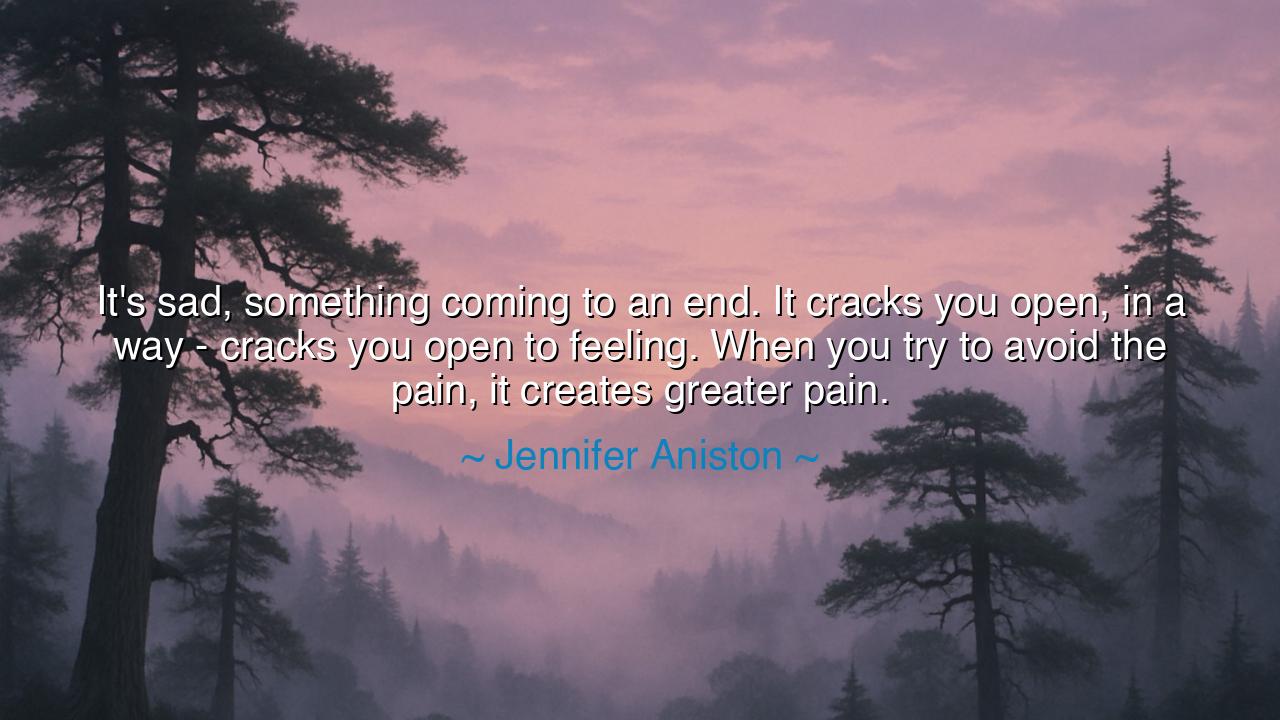
It's sad, something coming to an end. It cracks you open, in a
It's sad, something coming to an end. It cracks you open, in a way - cracks you open to feeling. When you try to avoid the pain, it creates greater pain.






Hearken, O children of the ages yet unborn, and attend the words of Jennifer Aniston, who spoke with the wisdom of the heart: “It’s sad, something coming to an end. It cracks you open, in a way—cracks you open to feeling. When you try to avoid the pain, it creates greater pain.” In these words lies a meditation upon the inevitability of change, the necessity of emotional courage, and the paradoxical power of embracing sorrow to awaken the fullness of the soul.
Consider the meaning: when life draws to a close—whether a chapter, a relationship, or a dream—the natural response is often to resist, to flee from the ache. Yet Aniston teaches that this resistance intensifies the suffering. True healing begins not in avoidance, but in the willingness to feel, to open the heart to grief and loss. In being “cracked open,” the human spirit gains the capacity for empathy, reflection, and deeper connection with the world around it.
History offers countless illustrations of this truth. Recall the life of Marcus Aurelius, the Roman philosopher-emperor, who faced the deaths of loved ones, the betrayals of allies, and the heavy burdens of governance. He observed that suffering, when confronted directly, fosters resilience, insight, and virtue. To shy away from grief is to harden the heart, but to meet it fully is to allow one’s spirit to grow and to discover strength beyond the trials of the body or circumstance.
Aniston’s words also speak to the universality of loss and impermanence. All things are subject to the law of change: youth fades, seasons shift, relationships evolve. This is neither evil nor punishment, but the natural rhythm of existence. To recognize and honor the endings in life is to attune oneself to the eternal cycles, to understand that each closure carries within it the seed of transformation, insight, and renewal.
Even in ordinary life, the lesson is clear: when a friendship dissolves, when a job ends, when a home is left behind, one feels the sting of sadness. Yet to resist that emotion, to deny the heart’s response, is to magnify the suffering. By embracing the pain, by allowing oneself to feel fully, one cultivates the wisdom of experience, the clarity of reflection, and the capacity to cherish the joys yet to come.
Consider the story of C.S. Lewis, who endured the death of his beloved wife, Joy Davidman. His grief was immense, a chasm of pain that could have consumed him. Yet in facing it openly, in acknowledging the depth of his sorrow, he transformed his anguish into profound insight, writing with enduring power about love, loss, and the human spirit. His life exemplifies Aniston’s truth: only when the heart is cracked open can the full spectrum of feeling—and wisdom—enter.
From this, let us draw guidance: do not flee from endings. Allow yourself to be touched by sadness, to be opened to feeling, and to confront the pain that accompanies life’s transitions. Seek support, reflect, and express your emotions through words, art, or communion with others. Each ending, though sorrowful, is an opportunity to cultivate strength, compassion, and understanding.
Finally, carry forward this insight into your own life: meet endings with courage, embrace the pain they bring, and allow your heart to be cracked open. In doing so, you cultivate resilience, deepen empathy, and prepare your spirit to encounter the next joys, challenges, and mysteries of life with openness and grace. In the paradox of loss lies the greatest teacher: that through sadness, we come to know the profound richness of feeling, and through feeling, the fullness of living.






AAdministratorAdministrator
Welcome, honored guests. Please leave a comment, we will respond soon